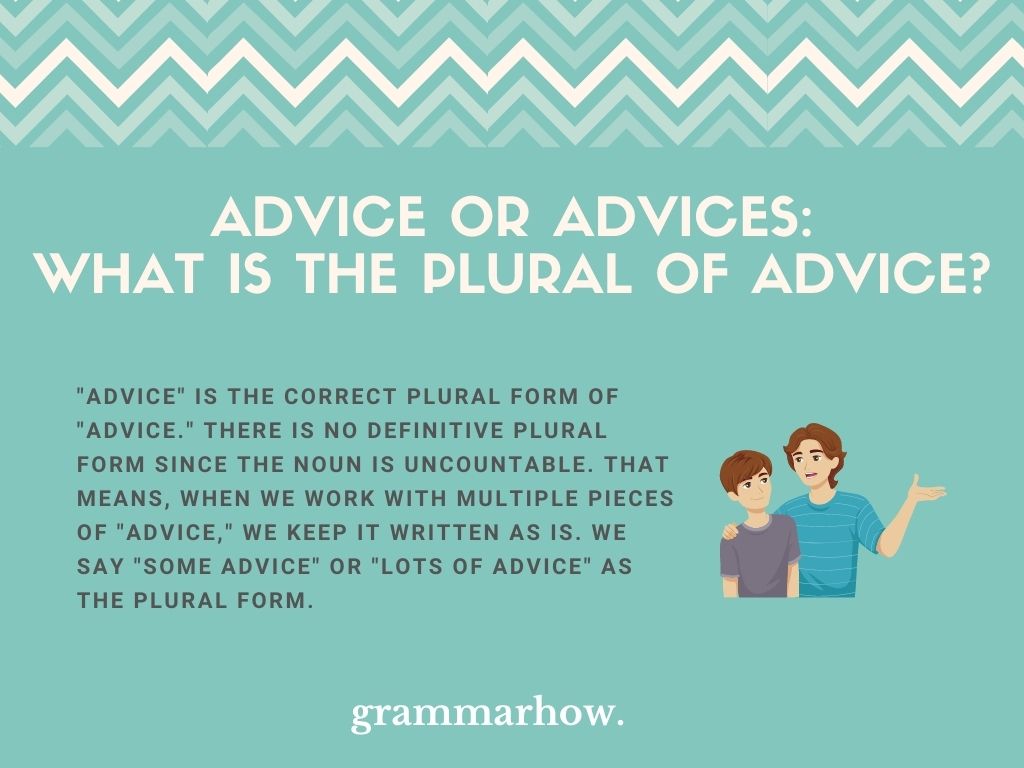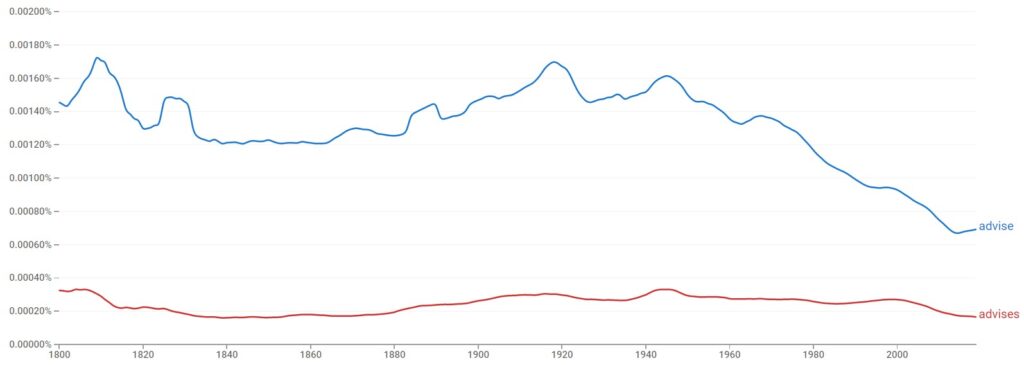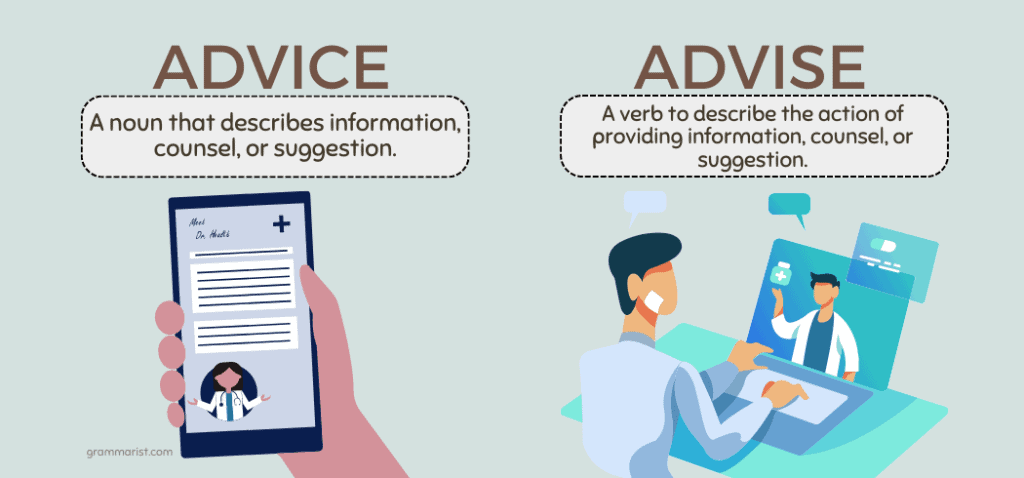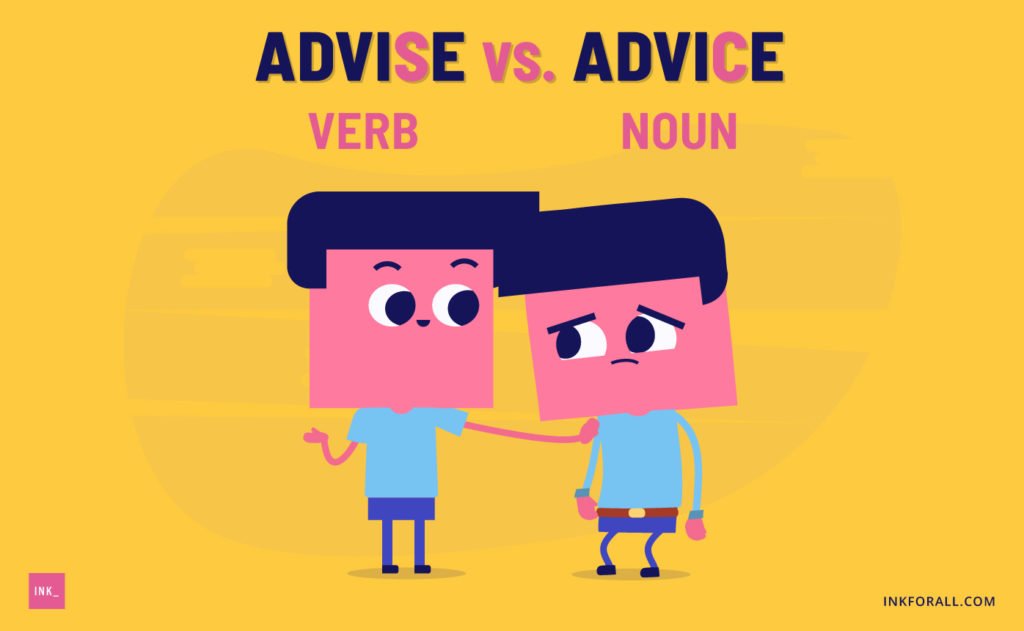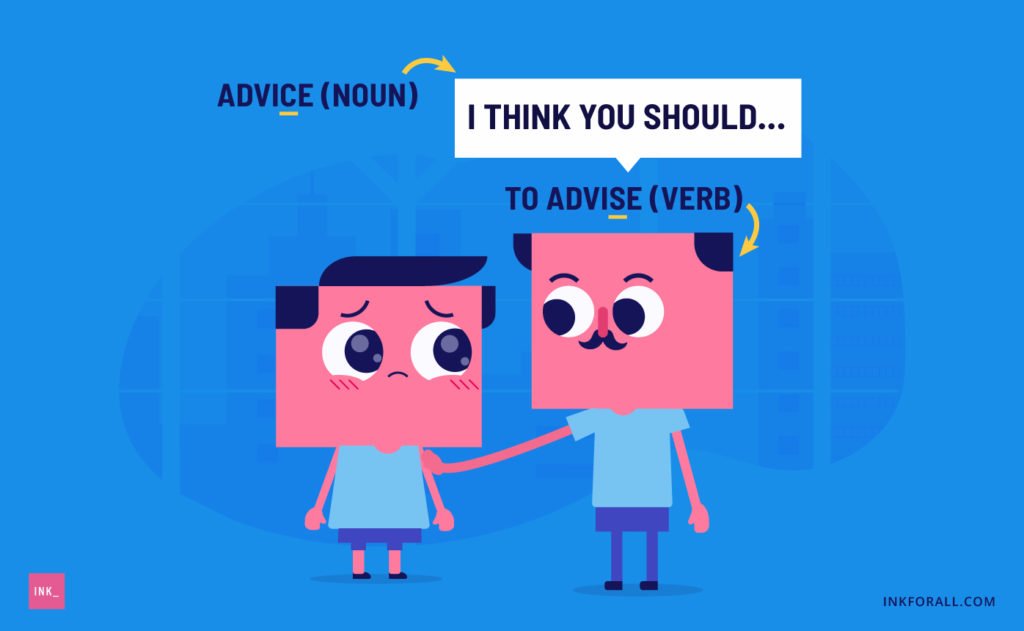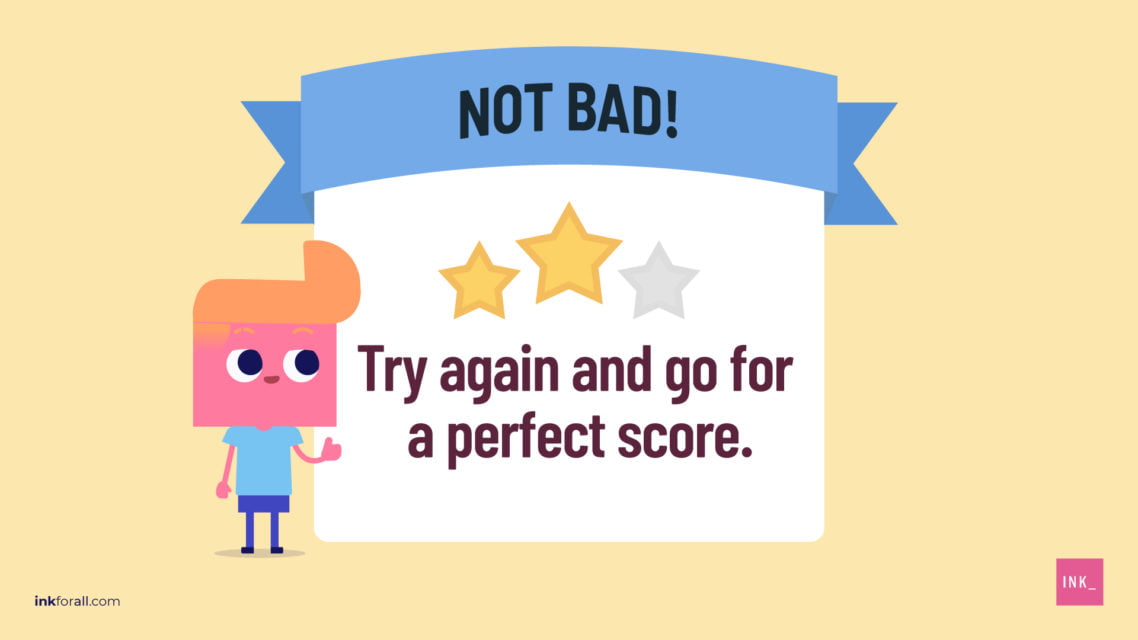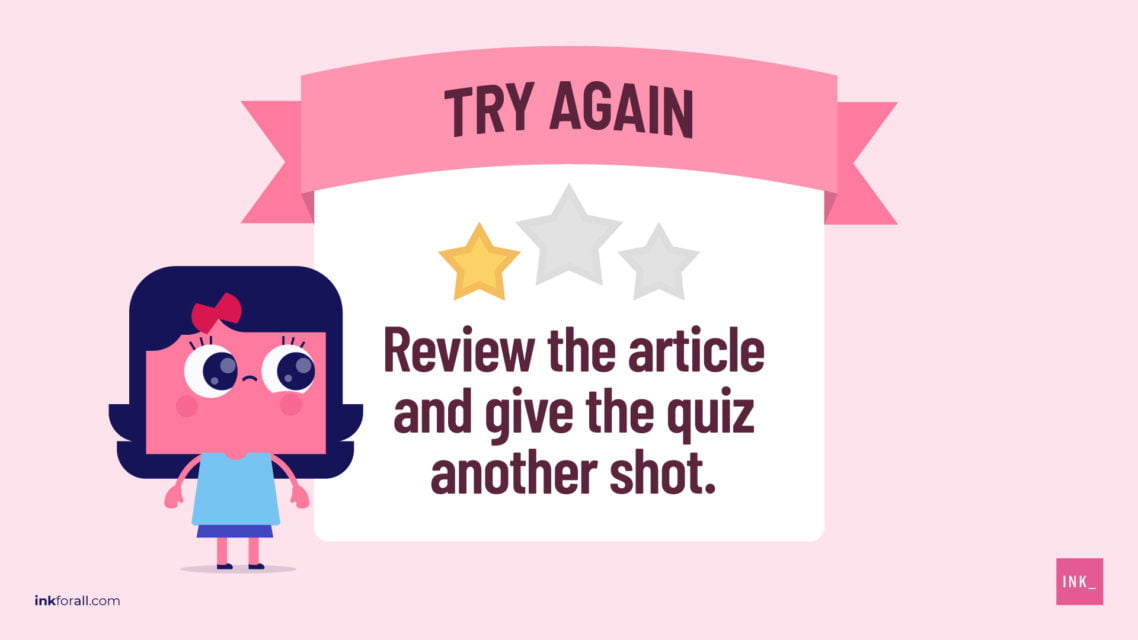Sometimes, we come across uncountable nouns in English. They create a problem, unlike any other words. Usually, when dealing with more than one thing, we add an “S” for the plural form. For uncountable nouns, like “advice,” the rules are different, and this article will explore it.
Advice Or Advices: What Is The Plural Of Advice?
“Advice” is the correct plural form of “advice.” There is no definitive plural form since the noun is uncountable. That means, when we work with multiple pieces of “advice,” we keep it written as is. We say “some advice” or “lots of advice” as the plural form.
The definition of “advice,” according to The Cambridge Dictionary, is “an opinion that someone offers you about what you should do or how you should act in a particular situation.
How Prevalent Is The Use Of “Advices”?
While “advices” is incorrect, that doesn’t mean it doesn’t get used. Plenty of native speakers sometimes struggle with the rules that follow uncountable nouns, and we have the statistics to prove it.
According to Google, “Advices” is mentioned 17,700 times on The New York Times website, while “Advice” is mentioned 246,000 times.
We also have this graph to share with you, which shows how common “advice” is since it’s the correct form. However, “advices” does still see some usage in modern times (though it definitely was more popular between one and two centuries ago).
So, why does “advices” seem to be so common to mistake? Usually, with other uncountable nouns (like “research”), most native speakers have an easy time remembering the difference.
However, there is a verb form, written as “advises.” This could be the best explanation as to why some people use “advices” instead of “advice” when writing in the plural form.
Examples Of How To Use The Plural Of Advice In A Sentence
We’ve spoken a lot about “advices” being wrong, but that’s not much help if you don’t know what the right form is. We’ve put together some examples to help you out with this, and we suggest you read them to familiarize yourself.
There are plenty of ways to use the plural of “advice,” though each time only uses it as “advice.” The word in front of “advice” shows it’s the plural form (like “lots of” or “much” or “some”).
- They gave me lots of advice to help me out.
- I have some advice that I think you’ll benefit from.
- There is plenty of advice that I could give you here.
- We have more advice if you’re willing to listen to it.
- She gave me lots of advice to help me understand what to work on.
- Is there any more advice you can give me?
- Do you have some more advice for me?
- That’s almost too much advice, but I’ll keep working on it!
As you can see, the words before “advice” are what determines whether it’s a plural form. No one writes “advice” and expects people to know that they mean there are multiple instances of it. For example:
- He gave me advice. (Singular form)
- He gave me some advice. (Plural form).
Advice – Synonyms
If you’re struggling with the rules surrounding uncountable nouns, you might benefit from one of these synonyms. These will help you understand the words in a more familiar way, and you can use an alternative while still conveying the same meaning you want to.
- Guidance
- Counseling
- Counsel
- Help
- Direction
- Instruction
- Information
- Recommend
- Guidelines
- Suggestions
- Hints
- Tips
- Ideas
- Opinions
- Pointers
There are plenty of synonyms for “advice.” Each one is used as a way to offer insight or opinions about a certain subject that most people will benefit from hearing.
Is It “Some Advice” Or “Some Advices”?
No matter what, “some advice” is always correct because “advice” is uncountable and looks the same in the singular and plural form. There are no cases where “some advices” is correct.
- Correct: He gave me some advice.
- Incorrect: He gave me some advices.
- Correct: I have some advice to help you.
- Incorrect: I have some advices to help you.
- Correct: Do you have some advice for how I can improve?
- Incorrect: Do you have some advices for how I can improve?
What Is The Difference Between “Advice” And “Advise”?
We’ve mentioned it earlier, but “advise” is perhaps the most obvious reason why people confuse the plural form of “advice.” There’s a key difference to pay attention to, though.
You should use “advice” as a noun to talk about opinions or information that somebody gives you to help you with something. You should use “advise” as a verb to talk about giving some your opinion on a matter.
The definition of “advise,” according to The Cambridge Dictionary, is “to give someone advice.”
According to this graph, “advice” is more common to use than “advise.” We typically sway towards the noun form in these cases and use other verbs like “give” or “told” to help us.
- He gave me advice.
- He advises me.
- I told you all the advice I could.
- I advised you.
Do You Ask For Advice Or Advise?
You ask for “advice” because it is the noun form, meaning you’re asking for someone else’s opinion on a matter. When you give “advice,” you are “advising” somebody.
The key difference is that “advice” is the noun while “advise” is the verb.
We can “advise” someone with “advice,” but we can’t “advice” someone with “advise.”
Is It Correct To Use “Advises”?
Finally, let’s look at when it’s possible to use “advises” in a sentence.
“Advises” is grammatically correct when you’re writing in the third person singular form (he, she, it). Otherwise, you should use “advise.”
According to this graph, it’s more common to use “advise” in the standard form. That’s because there are more situations where “advise” comes up with the correct pronouns. The choices for “advises” are more limited.
Here are some cases where we might use “advise” and “advises,” depending on the pronoun:
- I advise you not to do that.
- He advises me daily.
- They advise me all the time.
- She advises him not to.
You may also like:
10 Better Ways To Say “Please Advice” In Professional Emails
12 Best Ways To Politely Ask For Advice
“Please Be Advised”: Meaning & Alternatives (With Examples)
Martin holds a Master’s degree in Finance and International Business. He has six years of experience in professional communication with clients, executives, and colleagues. Furthermore, he has teaching experience from Aarhus University. Martin has been featured as an expert in communication and teaching on Forbes and Shopify. Read more about Martin here.
The word advice is an uncountable noun. Uncountable nouns do not have plural forms. They cannot be used with the articles a/an.
He gave me some advice. (NOT He gave me an advice.) (NOT He gave me advices.)
Incorrect: Let me give you an advice.
Correct: Let me give you some advice.
Incorrect: She was always there to give great advices.
Correct: She was always there to give great advice.
To refer to a single item of advice, you can use the expression ‘a piece of advice’, ‘a word of advice’ or ‘a bit of advice’. However, these expressions are not very common. Advice is mainly used on its own.
If you are worried about your symptoms, contact your doctor for advice.
The expression some advice is very common.
I really need some advice.
Don’t confuse advice and advise. Advice is a noun whereas advise is a verb.
Incorrect: I would advice you to quit smoking.
Correct: I would advise you to quit smoking.
Ways of giving advice
In English, we use several different expressions to give advice.
Examples are:
You should act more responsibly.
You ought to consult a doctor.
If I were you, I wouldn’t let this happen.
Why don’t you consult a doctor?
It is a good idea to invest in real estate.
All of these expressions are used when giving friendly advice.
The expression you’d (= you had) better is used to give strong advice.
You’d better consult a doctor.
Take it from me
This expression is used when you are giving advice based on your own experience.
Take it from me, it isn’t worth buying a cheap laptop.
Advice vs. Advise: How to Choose the Right Word
Get advice on advising
Updated on April 07, 2019
The words «advice» and «advise» have related meanings but are different parts of speech. The noun «advice» most often means guidance or a recommendation regarding a course of action («your friend gave you bad advice«), though it has a few other meanings as well. The verb «advise» means to caution, recommend, or counsel («let me advise you of your rights»).
How to Use «Advice»
«Advice» is pronounced «ad-vīs,» with the stress on the second syllable, which rhymes with «mice.» «Advice» means counsel, direction, or information—sometimes requested and sometimes given without permission. More rarely, «advice» is also a formal notice that a financial transaction has taken place.
Advice can be personal («Mom gave me some advice about how to handle guys like you»), professional («I went to my boss for advice on how to handle this type of customer»), or general («I need advice about where to go for dinner»). When the word is used formally in the form of a legal notice, it is almost always in written format («remittance advice,» for example).
How to Use «Advise»
«Advise,» pronounced «ad-‘vīz,» is a verb and is similar in general meaning to «advice.» In fact, it is technically correct to say «I advise you to take my advice.» The word can mean suggest («I advise you to take the longer route»), recommend («he advised me to stay away from Bill»), or inform («I’d like to advise you of the leaky faucet in that bathroom»). It can also mean be made aware of or apprise («you will be advised of our decision in due time»).
Examples
While you may ask for or receive advice, only another person can advise you. These examples clarify the proper use of each term.
- The best advice I can give you is to exercise, eat right, and avoid smoking. (The term «advice,» a noun, is here used as a synonym for «recommendation.»)
- The lawyer said he would advise us when it’s time to appear in court. (The term «advise,» a verb, is here used as a synonym for «tell» or «let us know.»)
- I always ask my best friend for advice before choosing an outfit for a dance. (The noun «advice» is here used as a synonym for «suggestions» or «recommendations.»)
- Will you give me some advice about how to get into a good college? (The noun «advice» is here used as a synonym for «recommendations.»
How to Remember the Difference
It’s helpful to remember that «advice» is always a noun, while «advise» is always a verb. It may also help you to think about another similar pair of words: «device» and «devise.» A «device,» like «advice,» is a thing rather than an action: You can actually use both a «device» and «advice.» «Devise» and «advise,» on the other hand, are always actions.
«Free Advice»
The expression «free advice» means a suggestion or an opinion that wasn’t asked for but is given nonetheless. Typically, parents, teachers, and friends give «free advice» when they believe someone they care about is making a bad decision. For example, «Here’s a bit of free advice: Stop drinking beer and start drinking water at least two hours before leaving a party.»
Sources
- «Advice vs. Advise.» Grammarist.
- «Advise or Advice?» OxfordWords Blog, Oxford University Press, 3 Jan. 2017.

Разумеется, первое отличие в написании — advice [əd’vaɪs] –пишется с буквой «c» в конце слова и является существительным, не имеющим формы множественного числа. Кто дает нам советы? Помимо дружеского совета можно получить консультацию юриста, (legal advice) врача (doctor’s advice). И поскольку мы сказали, что это существительное всегда стоит в единственном числе, оно будет сочетается с глаголом в форме единственного числа:
- John gave me some useful advice – Джон дал мне несколько дельных советов
- I met my lawyer to get his advice on the subject that interests me – я встретился со своим адвокатом чтобы получить консультацию по интересующему меня предмету
- According to doctor’s advice I should swallow those tablets the whole month – согласно совету врача я должен глотать эти таблетки целый месяц.
Выучим фразы со словом advice, которые нам пригодятся
Если же нужно подчеркнуть, что совет именно один, можно использовать фразу a piece of advice:
- Let me give you a piece of advice.
Advise — советовать, рекомендовать
Что касается глагола to advise [əd’vaɪz] он пишется с буквой s на конце слова и переводится как «советовать, рекомендовать»
- As your doctor I advise you to stay in bed – Как ваш доктор я советую вам оставаться в постели
- Before I take any decision I’ll advise with my parents – Прежде чем принять решение, я посоветуюсь со своими родителями.
- Which of the book would you advise me to buy? –Которую из книг вы посоветуете купить?
- Глагол to advise используется также в значении «извещать, уведомлять, сообщать»
• Please advise us of the date of the meeting – Сообщите о дате встречи, пожалуйста
• He advised the police about the lost child – Он сообщил в полицию о потерявшемся ребенке - Если вы указываете, по какому вопросу даете совет или рекомендацию, используйте предлог on, а если нужно сказать, что напротив, вы не советуете выполнять что-либо, используйте предлог against :
• He advised me on housekeeping – Он дал мне советы по домашнему хозяйству
• She advised me against buying those flowers – Она отговорила меня покупать эти цветы - Такое предложение как «Он посоветовал мне купить синий костюм» можно перевести на английский язык, используя оба слова advice и advise:
• He advised me to buy a blue suit.
• He gave me advice to buy a blue suit.
Главное – знать, как построить предложение с каждым из этих слов.
А теперь предлагаем вам пройти небольшой тест на эту тему.
Advice or advise
1. Your … was very useful, thank you.
a. advise
b. advices
c. advice
2. He … me … cooking a very good salad.
a. advised, on
b. adviced, on
c. advised, against
d. adviced, against
3. The lawyer … me in the subject I was interested in.
a. adviced
b. advises
c. advised
4. If you follow your doctor’s … you will recover soon.
a. advise
b. advices
c. advice
5. Mother … making friends with those guys. They are known to be a bad company.
a. advised on
b. adviced on
c. advised against
d. adviced against
6. It is just a piece of friendly … you needn»t follow it if you don»t like.
a. advice
b. advise
c. advices
7. Would you please … me of the forthcoming meeting?
a. advice
b. advising
c. advise
8. Please let me know as soon as you are … of the results.
a. adviced
b. advise
c. advised
9. Do you know anyone who can give me some professional … on divorces?
a. advice
b. advise
c. advices
10. Your misleading … resulted in problems for me.
a. advise
b. advices
c. advice
Asked by: Ona Hyatt
Score: 4.6/5
(69 votes)
So, the main difference between advice vs advise is that “advise” (with an S) is a verb that to recommend, or to give information to someone. On the other hand, “advice” (with a C) is a noun: an opinion or recommendation offered as a guide to action. Read below how you can use them in a sentence.
How do you use advice and advise in a sentence?
Using Advice and Advise in a Sentence
- You’ve done this before, please give me your advice.
- I need your advice on which car to buy.
- Her father gave them sound financial advice.
- She took my interview advice on board and got the job.
- Always get home improvement advice from an expert.
How do you use advise in a sentence?
Advise sentence example
- I couldn’t think of a logical way to advise Detective Jackson. …
- He’ll advise you and help you in ways I can’t. …
- My queen, I feel I must advise you. …
- It was stupid to eat something from the woods without having someone to advise her.
Is advice and advise the same?
The main difference between ‘advice’ and ‘advise’ is this: advice is a thing (a noun), advise is an action (a verb).
How do you use advice?
Using Advice in a Sentence
- give/offer/provide advice. The wise old woman provided advice to those who asked her for it.
- seek/ask for advice. He was too proud to ever seek advice.
- follow advice: do what the person advised. …
- expert advice: a qualified opinion.
25 related questions found
How do you use advise as a verb?
In other words, the verb advise means «to give advice.» Here are examples of correct use of both words: I advise you to stay at home—the weather is nasty. The attorney advised her client to not sign the contract. Patience is always advised when dealing with children.
Is saying please advise rude?
In the end, there’s nothing grammatically wrong with “please advise.” It’s just a question of usage and style. Some people don’t like it because it can be interpreted as rude or demanding. Other people think it’s redundant: just ask your question and call it a day.
Can you please advice or advise?
Do you use “Please advice” or “Please advise”? Well, the correct phrase is actually “Please advise”. Some grammar experts say that “Please advise” must have an object after the phrase because advise is a transitive verb. But since it’s widely used (especially in email), “Please advise” is grammatically accepted.
Can I say advices?
Slightly surprisingly, “advice” is an uncountable (mass) noun in English (like “water” or “sand”), and as such it has no plural form: correct His advice was very helpful. wrong His advices were very helpful. … Since it is uncountable, we cannot say “an advice”.
Where we can use advice?
So, the main difference between advice vs advise is that “advise” (with an S) is a verb that to recommend, or to give information to someone. On the other hand, “advice” (with a C) is a noun: an opinion or recommendation offered as a guide to action. Read below how you can use them in a sentence.
What does seeking advice mean?
From Longman Dictionary of Contemporary English seek (somebody’s) advice/help/assistance etcformalASK FOR something/ASK somebody TO DO somethingADVISE to ask someone for advice or help If the symptoms persist, seek medical advice.
How do I ask for advice?
Stop asking, ‘Can I pick your brain? ‘ Harvard researchers say this is how successful people ask for advice
- Start with a positive tone. …
- Identify the type of advice you’re seeking. …
- Come prepared with specific details. …
- Ask the right person. …
- Don’t ask everyone. …
- Don’t assume you already know the answers. …
- Be grateful.
How do you say I need your advice?
Examples include:
- ”I am writing to ask if you could help me with…”
- ”I would appreciate if you could give me some advice about…”
- ”I am writing to ask for your advice.”
- ”I wonder if you could help me with a problem.”
Can you give me some or any advice?
In Oxford Learner’s Dictionaries, «advice» is uncountable noun, so «Some advice» is the correct one. However, googling «some advices» returns 400K results and in fact many formal English articles / news use «some advices» as in this article on Yahoo News: «Real World 101: What Every Graduate Should Know».
What does good advice mean?
an opinion that someone offers you about what you should do or how you should act in a particular situation: She gave me some good advice.
What is the difference between advice and information?
Information is factual and not based on opinion or one person’s point of view; therefore it is normally something you can rely on. Advice is a recommendation and is not always based on fact. Advice is normally given if a person provides more information about their situation.
How do you write a letter of advice?
Here are five key tips for structuring your letter of advice.
- Start with a summary. …
- Present the problem and a range of potential solutions. …
- Choose the best solution and provide step-by-step actions to take. …
- Make it clear if you are making assumptions or need further information.
Can you please advise example?
Please advise me on the foods / vitamin supplements I should take. Please advise any changes needed or if we need any additional documentation. It’s difficult to see please advise in a sentence . Can you please advise me on how to get my article published?
What does please advise really mean?
Please advise is a formal request for information, often associated with professional correspondence. The expression is often interpreted as a passive-aggressive phrase in business contexts and tongue-in-cheek in casual contexts.
Is Please be advised polite?
“Please be advised,” holds the same function in English. It makes the phrase more polite and respectful.
What tense is advice?
The past tense of advice is adviced. The third-person singular simple present indicative form of advice is advices. The present participle of advice is advicing.
What part of speech is advice?
Advice is a noun meaning “an opinion or recommendation offered as a guide to action, conduct, etc.”
What is the verb form of advice?
advise. (transitive) To give advice to; to offer an opinion, as worthy or expedient to be followed. (transitive) To give information or notice to; to inform or counsel; — with of before the thing communicated.
How do you give advice examples?
Giving Advice
- (I think/I really think) you need to/must/should …
- How about …?
- It is usually a good idea to …
- My suggestion/advice is (to) …
- Why don’t you …?
- You could (try) …
- You probably/definitely/really should …
совет, консультация, мнение, авизо, суждение, сообщение
существительное ↓
- совет
a piece /a bit, a word/ of advice — совет
to ask /to seek/ smb.’s advice — советоваться с кем-л.
to follow smb.’s advice — следовать чьему-л. совету
to take smb.’s advice — послушаться чьего-л. совета; советоваться /консультироваться/ с кем-л.
to act on /at, by, under/ smb.’s advice — действовать /поступать/ по чьему-л. совету
- консультация (юриста, врача)
legal advice — консультация юриста
- обыкн. pl сообщение; информация; извещение, уведомление
disagreeable advices — неприятные новости /известия/
advice from abroad informs us that — из сообщений, поступивших из-за рубежа, мы узнали, что
- ком. авизо
- в грам. знач. глагола ком. авизовать
Мои примеры
Словосочетания
a bullheaded boss who won’t take advice from anyone — упрямый босс, который не слушает ничьих советов 
letters to his son full of homely advice — письма к сыну, полные простых советов 
a source of valuable insights and sapient advice to educators — источник ценных идей и мудрых советов преподавателям 
to depend upon smb. for advice — зависеть от чьего-л. мнения, совета 
to dish out advice — давать ненужные советы 
under due advice — при соответствующем уведомлении 
to act (up)on smb.’s advice — действовать по чьему-л. совету 
sensible / sound advice — разумный совет 
misleading advice — совет, вводящий в заблуждение 
to give / offer smb. advice to do smth. — давать кому-л. совет, советовать кому-л. что-л. сделать 
to disregard / refuse / turn a deaf ear to advice — не послушаться совета, пропустить мимо ушей 
wise piece of advice — мудрый совет 
Примеры с переводом
Let me give you some advice. 
Позвольте мне вам кое-что посоветовать.
Do you want some good advice? 
Хочешь хороший совет?
The advice came too late. 
Совет чересчур запоздал.
I would fain follow your advice. 
Я с радостью последую вашему совету.
I’ll defer to your advice. 
Я последую вашему совету.
Let me give you a piece of advice. 
Позвольте мне кое-что вам посоветовать.
Per your advice, I accepted their offer. 
Согласно вашему совету, я принял их предложение.
ещё 23 примера свернуть
Примеры, ожидающие перевода
He offered words of advice and admonition. 
He continued to drink despite advice to the contrary. 
…seasonable advice is more likely to be listened to… 
Для того чтобы добавить вариант перевода, кликните по иконке ☰, напротив примера.
Возможные однокоренные слова
misadvice — плохой или неправильный совет
You aren’t alone if you don’t know the difference between advice and advise. These words not only look alike, but they also sound similar and are related by a similar definition as well.
This confuses not only English language learners but also native speakers.
Despite their similarities, they function very differently in speech and writing, and it is important to use them correctly in order to avoid confusing your audience. Below, we define the differences, show you how to use each word, and provide examples of advise and advice to help you remember which one is which.
What’s the Difference Between Advice and Advise?
The main differences between these two words are the grammatical form of use and the differences in spelling and pronunciation. Both words deal with information, counsel, or suggestions, but their parts of speech are different.
Advice is a noun that describes information, counsel, or suggestion. Advise is a verb to describe the action of providing information, counsel, or suggestion.
Advice Meaning and Use
Advice is a noun and represents information, counsel, or a recommendation about what could or should be done.
It is pronounced uhd-vise, and advice rhymes with “ice.”
For example:
- I’m offering you this expert advice for free, so you might as well accept it.
- She gave him bad advice concerning the completion of his homework.
- I will accept your overdue advice on one condition, that you cheer for me when I graduate.
- The advice column was printed in the Sunday newspaper.
- She went to her counselor seeking legal advice.
Origin of Advice
Advice is a late 13th-century word from the Old French auys, meaning “opinion,” and avis, meaning “a judgment, view, idea, or opinion.” Both stem from the phrase ço m’est à vis, or “it seems to me.”
It was ultimately from the Latin word visum, meaning “to see.”
Advise Meaning and Use
Advise is a verb. It means to actively give counsel or offer recommendations about something.
It is pronounced uhd-vize, and advise rhymes with “wise.”
For example:
- How will you advise her to apply for the scholarship?
- My teacher always advised me to do the correct thing, even when it was difficult.
- I advise you to pay close attention to what happens in the next few weeks.
- My boss advises his staff to always double-check their time cards to ensure proper, timely payments.
- I’m advising you to find a good financial advisor before you decide to purchase that home.
Origin of Advise
Advise is from the late 13th-century Old French word avisen, meaning “to view or to consider.” In the late 14th century, the word became aviser, meaning “to reflect, consider, or deliberate.”
Avisen and aviser also originate from the French avis, meaning “a judgment, view, idea, or opinion,” and have the same Latin visum influence as the word advice.
How to Remember the Difference
Keep in mind the following pattern of word endings to help clue you into the correct spelling and use of advice and advise.
- Advice, ending in -ice, is the same as ice, which is a noun. Most nouns end in -ice.
- Advise, ending in -ise, is usually the ending of a related verb form such as devise or advertise.
Let’s Review
Advice is a noun and is what you provide to a person when they are seeking information, opinion, or suggestions. Advise is a verb and is the act of providing information, opinion, or suggestions.
They are not only spelled differently but also pronounced differently. Despite being easy to confuse with one another, they serve very different purposes. Remember the ending of advice, -ice, and apply it to the word ice to help you remember it works as a noun in speech and text.
Сегодня мы поговорим о словах advice и advise. Как видите, они различаются только одной буквой. Что же будет, если перепутать их? Скажем так, их значение очень близко, поэтому понимание вряд ли пострадает, но грамматическая ошибка будет точно. Итак, давайте разберемся, что же из них что.
Advice
Произношение и перевод:
Advice [ədˈvaɪs] / [эдв`айс] – совет
Значение слова: Рекомендация по поводу того, что делать в той или иной ситуации.
Употребление
Обратите внимание: это слово в английском языке неисчисляемое! То есть:
- Его невозможно поставить во множественное число: «advices» не существует!
- Его невозможно использовать с артиклем a/n — «an advice» тоже сказать нельзя!
Например: Я всегда хожу к Саре за советом (advice). На твоем месте я бы не следовал этому совету (advice).
Если же вы хотите «посчитать» советы, то используйте фразу: piece of advice, буквально «кусочек совета».
Например: Друг дал мне пару советов (two pieces of advice). У меня есть для тебя один советик (one piece of advice).
Пример:
I need to ask my doctor’s advice before taking these meds.
Мне нужно спросить совета у своего врача, прежде чем принимать эти лекарства.
Take my advice: nothing good will come out of it
Послушай мой совет: это до добра не доведет.
Хотите заговорить на английском?
Приходите на наш бесплатный онлайн мастер-класс «Как довести английский язык до автоматизма»
Подробнее
Также Вы можете ознакомиться со всеми онлайн-курсами английского языка.
Advise
Произношение и перевод:
Advise [ədˈvaɪz] / [эдв`айз] – советовать, давать совет/рекомендацию
Значение слова: Давать рекомендации по поводу того, что делать в той или иной ситуации
Употребление:
Например: Я советую тебе (advise you) принять меры предосторожности. Я не могу давать тебе рекомендации (advise you) в этих вопросах, потому что я не специалист.
Если вы советуете что-то НЕ делать, то используйте advise со словом against ([əˈgɛnst]/[эг`енст] «против»). Обратите внимание, что следующее после advise against действие будет с -ing!
Например: Консультант не советовал (advised against) нам продавать дом в кризис. Я не рекомендую (advise against) этот отель.
Пример:
My trainer advised me to be careful while exercising.
Мой тренер советовал мне быть осторожным во время упражнений.
Normally I would advise against rash decisions, but this situation requires quick action!
Обычно я бы не рекомендовал поспешное решение, но это ситуация требует быстрых действий!
В чем разница?
Advice — это «совет», то есть, существительное (предмет)! Например: Мне не нужны твои советы (advice). Я прочел этот совет (advice) в интернете.
Advise — это «советовать», то есть, глагол (действие)! Например: Адвокат посоветовал (advised) нам воздержаться от комментариев. Они посоветовали мне (advised me) взять с собой паспорт.
Как я уже говорила: понять вас поймут, однако перепутать эти слова будет все равно ошибкой. Обратите внимание также на то, что они не только пишутся по-разному, но и произносятся! Так что и в устной, и в письменной речи я вам советую (I advise you) быть с ними аккуратными.
Задание на закрепление
Вставьте правильные слова в следующие предложения. Свои ответы оставляйте в комментариях.
1. Метеорологи ___ не ходить под деревьями.
2. Послушай Джона: он не ___ плохих вещей.
3. Я ___ продумать маршрут заранее.
4. У меня есть ___, который точно тебе поможет.
5. Я последовал твоему ___ и сделал все, как ты сказал.
6. Том вечно везде лезет со своими ___!
Main Advise vs. Advice Takeaways:
- Adviceand advisesound similar, but they’re not the same.
- Advice is a noun, while advise is a verb.
- You can giveadvice to someone, or you can advise someone.
- Please advise or kindly advise are requests for information. Some people don’t mind these phrases, while others consider them abrupt or passive aggressive.
- Please be advised is a phrase used to share information with a formal tone.
Do you advice someone, or do you advise them? Do you receive advise or advice? Although the English language makes a distinction between advise and advice, it is not always easy to tell the difference because they are both commonly used in everyday conversations. However, understanding the difference between advice vs. advise is the key to knowing how each word should be used. In this post, we’ll cover the difference between these two words plus when and how you should use them.
What’s the Difference Between Advice and Advise?
On the surface, advice and advise sound the same, but they are actually different in meaning. Besides their difference in spelling and pronunciation, they also answer different questions. Advice (c pronounced as s) is a noun. It refers to the opinion or suggestion that you give or receive from someone. Advise (s pronounced as z), on the other hand, is a verb. It refers to the actual act of giving information and guidance to someone.
Do You Advise or Advice?
You can advise (with an ‘s‘) because advise is a verb. You can’t advice (with a ‘c‘) because this word is a noun. In other words, advice is a noun — it’s a thing.Advise is a transitive or an intransitive verb — it’s a “doing word.” You can’t chair someone, but you can give them a chair. Similarly, you can’t advice someone, but you can give them advice.
Advice vs. Advise Pronunciation Guide
These two words look alike, but they sound different when spoken aloud.
👀 On one hand, the ‘s‘ in advise is almost pronounced like a ‘z‘ (add-VYZ). If it rhymes with the word “eyes,” you know you’re pronouncing advise correctly.
🧊 On the other hand, the ‘c‘ in advice is pronounced like an ‘s‘ (add-VICE). If it rhymes with the word “ice,” you know you’re pronouncing advice correctly.
How Do You Use Advice and Advise in a Sentence?
Here are the best examples of how to use advice and advise in a sentence:
Is Please Advise Rude?
The phrase “please advise” is a succinct request for information or guidance, and isn’t necessarily rude. However, it depends on the context as well as the speaker’s tone, intention, and style. For instance, some may take it as too short, blunt, demanding, or even passive aggressive. Moreover, some consider it redundant and would prefer a direct question. On the other hand, it can also stand in for “let me know” (Should you have any questions, please advise).
Let’s look at a few examples of “please advise” in action:
In the first instance, “please advise” comes across as benign and a little dry, but not rude. In the second instance, the reader knows they’re in trouble. Tone can be hard to read via email, so if you’re in doubt, use a different phrase.
What is Another Word for Advice?
Here are other names and synonyms for the noun advice:
- Guidance
- A recommendation/some recommendations
- Input
- An opinion/your opinion
- Some help
- A suggestion/some suggestions
- A tip/some tips
- A word of wisdom
- Some pearls of wisdom
Advise vs. Advice Recap
Is it advice or advise?Advise and advice are two words that frequently cause authors confusion. Notwithstanding, advise and advice play slightly different roles: they’re similar — but they’re not the same. For instance, you can advise someone, or you can give them advice.
When to Use Advice (with a ‘c’):
- When you need a noun, use advice.
- Advice is a noun, or an object, like a cupcake. You give someone advice; you give someone a cupcake.
When to Use Advise (with an ‘s’):
- When you need a verb, use advise.
- To advise is a verb that means to give advice.
- You advise someone; you direct someone.
Feeling clearer about advise vs. advice? Test your grammar knowledge with our quick quiz below.
Advice and Advice Question #1
Correct!
Wrong!
The answer is FALSE. Although «advice» and «advise» sound similar, they’re not the same.
Advise or Advice Question #2
Correct!
Wrong!
The answer is B. «Advise» functions in a sentence as a verb.
Advice or Advise Question #3
Correct!
Wrong!
The answer is B. «Advise» means to give a recommendation.
Advice vs Advise Question #4
Correct!
Wrong!
The answer is B. The “s” in “advise” is almost pronounced like a “z.”
Advice and Advise Question #5
Correct!
Wrong!
The answer is A. «Advice» refers to the suggestion or a recommendation itself.
Advise vs Advice Question #6
Correct!
Wrong!
The answer is FALSE. «Please advise» is a concise request for information.
Advise vs. Advice Quiz Result
Expert!
Not bad!
Almost got it! Review the article and try again.

